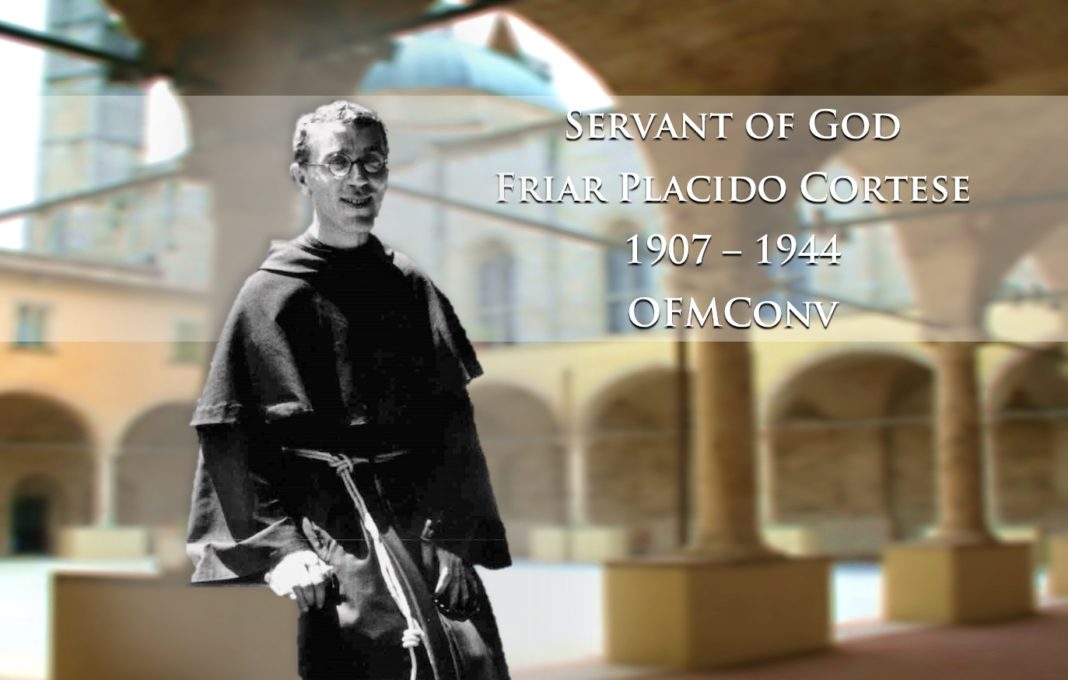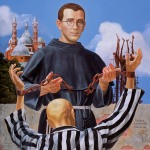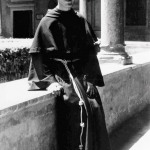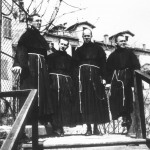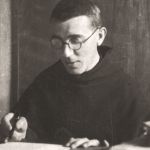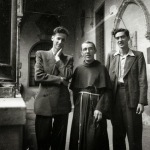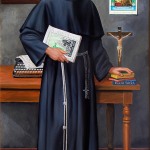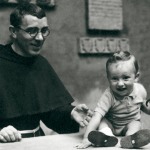Nicolò Matteo CORTESE was born on March 7, 1907, in Cres – Croatia, then a part of the Austro-Hungarian Empire. He attended primary school in his hometown where he met the Friars Minor Conventual, who were serving at the Church of St. Francis. In 1920, he was accepted into the college of the Order in Camposampiero – Padua, Italy.
Taking the name Friar Placido, he completed his novitiate at the Friary of St. Anthony in Padua and professed his temporary vows on October 10, 1924. On October 4, 1928, he made his solemn profession at the Basilica of St. Francis in Assisi.
He completed a high school course in philosophy in Cres (1925-27) and four years of theology studies (1927-31) at the Theological Faculty of St. Bonaventure in Rome, where he was renowned for his modesty and amiability, qualities that would distinguish him ever after.
On July 6, 1930, he was ordained to the priesthood in Rome and spent his first years as a priest (1931-1933) serving at the Basilica of St. Anthony in Padua. From December of 1933 to January of 1937 he lived at the friary on Viale Corsica in Milan, where he served as Assistant Pastor at the Church of Beata Vergine Immacolata e Sant’Antonio which had been entrusted to the Friars Minor Conventual.
At the beginning of 1937, he was called back to Padua to take over as Director of the “Messaggero di Sant’Antonio” Magazine, a post he carried out with passion and competence until 1943. In early 1939, he inaugurated a new printing house and was responsible for a considerable increase in the magazine’s circulation; its readership doubled under his direction.
People appreciated his mild and humble character and he was always sensitive to the needs of others. In this way, he brought honor to the names he took when he made his religious profession: “Placido” and “Cortese”!
As the events of the Second World War intensified, Friar Placido’s charity really shone through. During 1942-1943, he brought relief to Slovenian and Croatian prisoners who had been deported to concentration camps in Italy, particularly the camp at Padua-Chiesanuova.
After the armistice of September 8, 1943, Padua fell under German occupation and the fury of Nazi persecution was unleashed. Friar Placido worked hard helping Jews, disbanded allied soldiers and others whom the Nazis persecuted or sought.
He was an important go-to man in Padua, part of the secret rescue network that had been set up by Professors Ezio FRANCESCHINI in Milan and Concetto MARCHESI in Padua. It was called “FRA-MA”, taken from their initials, and its purpose was to help the persecuted reach Switzerland.
Even under those frantic circumstances, Friar Placido remained faithful in his commitment to solidarity and charity. He had already expressed this commitment in a letter he wrote in 1933, in which he applied a famous Pauline expression to himself: “Caritas Christi urget me” (“The love of Christ impels me.” cf. 2Cor 5:14).
Then came Sunday, October 8, 1944, when, at about 1:30 p.m., two spies working for the Nazi SS called upon Friar Placido under a pretext. They offered him a ride in their vehicle, which was waiting in front of the Basilica of Anthony drove him to Trieste, to a Gestapo bunker in Piazza Oberdan, where he was subjected to interrogation and brutal torture, with the intention of unnecessarily extorting the names of his collaborators. Exhausted by ill-treatment, he was eventually killed in mid-November of 1944 and his body was burned in the crematorium of the infamous Risiera di San Sabba prison in Trieste.
Since then, a great deal of valuable testimony has emerged about the last weeks of Friar Placido’s life and his death. This testimony detected the traits of martyrdom, as it had for St. Maximilian M. KOLBE, launching Friar Placido’s cause for beatification and canonization, with the diocesan inquiry “super martyrio”, held in Trieste in 2002-2003. That was followed by the “super virtutibus” in 2012. This last appellative served in the drafting of the “Positio.” On January 31, 2017, the Positio received the favorable vote of the Historical Consultors to the Congregation for the Causes of Saints. In 2018, the “Positio super virtutibus”, supplemented with the vote of the Historical Consultors, was definitively published and put on file.
The “Special Congress” of the Theological Consultors was scheduled for March of 2020, but had to be rescheduled due to the Covid-19 health crisis.
The cause for the Servant of God Placido CORTESE not only encompasses the Italian Province of St. Anthony of Padua (Northern Italy), it involves the Provinces of Croatia and Slovenia, as well. It also includes a number of local Churches, located in Padua and Trieste, Italy; in Ljubljana, Slovenia; and in KrK, Croatia.
Authorities have bestowed many posthumous awards upon the Servant of God. Notably, in 2017, Friar Placido was awarded the Gold Medal of Civil Merit by the President of the Italian Republic, Sergio MATTARELLA. President MATTARELLA made an official speech calling Friar Placido CORTESE a “martyr”. On February 7, 2020, the President visited the Basilica of St. Anthony of Padua and wanted to pay personal homage to Friar Placido. He paused and stood before Friar Placido’s memorial, which features the confessional from which he directed his operations during those tragic years of the Second World War. Friar Placido turned his confessional into a crossroads of contacts and information in order to save those whose lives were in peril.
Totally a man of God, Friar Placido CORTESE defended the weak and the persecuted whose rights had been heavily trampled upon during the painful times of the Second World War. He was a sincere devotee and imitator of St. Anthony of Padua. In his day, he was an authoritative interpreter of the works of St. Anthony. In 1964, Friar Vergilio GAMBOSO, a confrere, wrote: “We can well say that the intrepid heart of his beloved Saint Anthony of Padua lived again in this tireless little friar.”
For more information, go to: https://www.padreplacidocortese.org/cortese/
Friar Giorgio LAGGIONI






